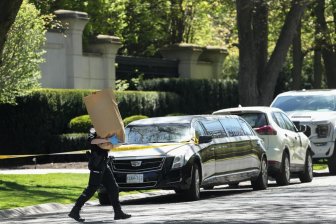New Brunswick health officials have announced changes to the COVID-19 vaccine rollout, after shipment delays and re-routed doses dented the province’s distribution plan.

Dr. Jennifer Russell, New Brunswick’s chief medical officer of health, announced at a briefing on Thursday that the province will delay administering the second dose of vaccine for those who are considered to be at a lower risk.
By pushing the date of the second dose, Russell said it will allow them to get doses into more arms as soon as possible, thereby lowering the number of hospitalizations and making sure the health-care system is not overwhelmed.
“We must broaden the scope of our vaccine campaign to ensure we do protect those most vulnerable.”
Russell said while this approach carries some unknowns, it is an approach that is being increasingly used “as an acceptable and manageable option.”
“Our failure to act would in fact be the greatest risk to New Brunswickers,” she said. “This is not a perfect approach, but action is required.”
As of Tuesday, New Brunswick has administered 21,182 doses of the COVID-19 vaccine and 7,505 residents received their second dose.
The province received a total of 26,825 doses of COVID-19 vaccine, of which 5,643 doses are held in reserve.
As the province expected to receive more than 40,000 doses by now, New Brunswick health officials made the call to adjust the rollout timeline, starting with the second dose delay in Phase 2.

Priority groups and rollout timeline
In Phase 1, which is ongoing, the vaccine priority groups include:
- long-term care residents and staff
- front-line health-care staff
- First Nations adults
- individuals aged 85 and over
“We expect it will take until the end of March to offer the vaccine to everyone in our first priority group,” said Health Minister Dorothy Shephard on Thursday.
In the coming weeks, the province will be providing details on how those over the age of 85 can register to be vaccinated.
Shephard said Thursday that First Nations health directors and community health nurses have been engaged to provide the COVID-19 vaccine in those communities with the support of public health.
“We expect the first such clinic to take place in the first week of March in the Madawaska Maliseet First Nation, located in Zone 4.”
Clinics in other First Nations communities will be set up in the weeks ahead, she said.
“Now we can look ahead to April and May when we can expect to start vaccinating new groups of people,” Shephard said.

In April, the province expects to offer the first dose of the COVID-19 vaccine to those over 70 years old, beginning with those aged 80-84.
The second priority group, to be vaccinated in Phase 2 throughout April and May will include:
- those over the age of 70
- residents of communal settings
- health-care professionals providing direct patient care (pharmacists, dentists)
- first responders (firefighters and police officers)
- home support workers for seniors
- those with select complex medical conditions
- long-term care volunteers, designated support persons
- individuals over 40 years old with three or more chronic conditions
- truckers, rotational workers and regular cross-border commute workers
By June, New Brunswick expects to be able to provide the second dose of the vaccine to people over 70 years old, who had received their first dose in April or May.
In June, Phase 3 is expected to begin and additional groups will be prioritized, including:
- those with two or more chronic health conditions
- health-care workers with indirect patient contact
- school staff and high school and post-secondary students aged 16-24
Phase 4 is expected to begin in July, when the vaccine will be more widely available for all remaining New Brunswickers. The province said more details will be shared in the coming weeks about how people in priority groups can register to be immunized.

Shephard said the province expects to receive an increased number of shipments during the summer.
This will allow the province to administer first doses to all remaining New Brunswickers between July and September.
“We also anticipate that over the course of the summer we will be able to provide a second dose to anyone who has not yet received it.”
Shephard said the province is confident that delaying the second dose is a strategy that will ensure vulnerable residents are protected in a timely manner.
If more doses than expected become available, Shephard said the province intends to re-adjust the plan again.
Dr. Russell said she hopes there will be enough vaccine doses available by the summertime to meet the needs of everyone.
New Brunswick has not released details on the number of vaccination clinics it intends to run.
To date, New Brunswick has confirmed a total of 1,411 positive cases of the virus, of which 1,275 have recovered.
As of Thursday, the province had 111 active cases of COVID-19.
- N.S. couple felt they won ‘doctor lottery’ after years on wait-list. Now they’re back on it
- ‘Summer of discontent’ coming over public service in-office order: unions
- Family says infant killed in 401 crash leaves a ‘void that can never be filled’
- Jewish students say they don’t feel safe from antisemitism on campus





Comments